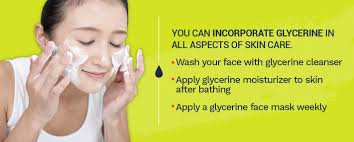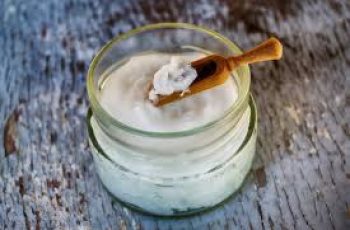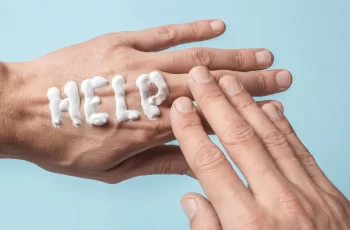What is glycerin? And what are its benefits for skin care?
Today we introduce you to an ingredient that you may have heard of but underestimated its power and impressive effects in your daily skincare routine. What exactly is glycerin? And what are the benefits for your skin? Let’s learn more about it.
What are the benefits of glycerin?
You will find glycerin as a natural component of healthy skin and is present in a variety of skincare products. It can be obtained from plant and animal sources, or it can be produced synthetically to create highly effective moisturizing products. This is also supported by the fact that glycerin is a humectant, which means it absorbs moisture from the air around us, helping to retain moisture in the skin. With these clever moisturizing properties, glycerin also supports the skin’s Natural Moisturizing Factor (NMF) because it can mimic the skin’s NMF, plumping and nourishing it, which begins to decline with age. If you want to learn more, you can read our blog post on Natural Moisturizing Factor (NMF) and its benefits for skin.
Glycerin has a variety of skincare benefits, the main one being moisturizing the skin. Here are some other benefits of this skincare ingredient:
Glycerin works well with other emollients and oils to restore moisture levels in the skin and make it soft, supple, and comfortable for dry skin types.
Glycerin can help strengthen the skin’s moisture barrier, making the skin look healthier and overall more youthful.
Glycerin can help protect the skin from environmental influences that can cause irritation.
Glycerin retains moisture in the skin, allowing other ingredients in skincare products to absorb quickly into the surface layers of the skin.
Glycerin improves the appearance of the skin and significantly reduces all signs of aging, such as fine lines and wrinkles.
Since glycerin is suitable for all skin types, it plays an important role in keeping the skin hydrated and balanced, especially during seasonal changes, when temperatures begin to drop and the climate becomes drier, which can affect skin health.
How is glycerin used in skin care?
In skin care, glycerin is often used with other types of moisturizers to lock in moisture in the skin. Because it does this so well, it has been ranked as the most effective moisturizer in various studies over the years. There are many other moisturizers found in skin care products, such as:
Alpha hydroxy acids, such as glycolic acid and lactic acid
Propylene glycol and butylene glycol
Hyaluronic acid
Sorbitol
Urea
Glycerin is becoming increasingly popular as one of the main ingredients in moisturizers and body lotions because it can have a positive impact on the skin, helping to reduce fine lines and wrinkles on the skin, which can become very noticeable when the skin is dehydrated. It can also help with the other factors mentioned earlier, contributing to overall skin health and appearance.
Can I use glycerin on my face every day?
Glycerin is found in many skin care products, and when used regularly, it is gentle on all skin types because it draws moisture from the environment and the inner layers of the skin. However, when using glycerin overnight, you need to take some precautions to prevent your skin from eventually becoming dry and showing signs of premature aging. When using raw glycerin, it is best to apply a thick layer of glycerin to the skin and leave it on for about 15 to 20 minutes before washing it off with warm water. However, if your product contains the properly diluted ingredient, it can be safely left on overnight.
Does Glycerin Have Anti-Aging Effects?
It wouldn’t be entirely accurate to say that glycerin itself is an anti-aging ingredient, but it is an ingredient that can support and prevent the signs of aging. When our skin is dehydrated, which is common, it is reflected in the appearance of our skin, causing it to look older than it actually is, with fine lines and wrinkles. Once glycerin, with its water-attracting properties, is applied to the skin, it becomes smoother, plumper, and more elastic, with all visible lines visibly reduced.
Glycerin can also help fight skin aging by protecting against free radicals and other environmental stressors, such as UV rays, pollution, and the elements of city life. All of these factors greatly damage the skin’s natural protective barrier, reducing the skin’s moisture and oil content, which weakens its defenses against the natural elements and causes the skin to age rapidly. Fortunately, glycerin can restore proper moisture levels, keeping the barrier fully functioning, and your skin healthy and happy.
What Are the Side Effects of Glycerin?
Glycerin is considered safe for all skin types and can benefit the skin in a number of ways. However, it is important to remember that glycerin is a natural ingredient and in some cases it can cause redness, rashes, and itching due to allergic reactions. Performing a patch test 24 hours before applying a product all over your skin can prevent this reaction. If you still experience a reaction, it’s best to stop using the product immediately and look for an alternative that may not have as much glycerin in its formula.
Now you have a clearer idea of what glycerin is and why you’ve probably noticed it in most of your favorite skincare products. Add this hydrating hero to your daily moisturizer, serum, or cleanser, and your skin will look youthful and comfortable—with a radiant complexion, of course!
DQH Knowledge drop: In your 20s, your skin cell turnover decreases. (Cell turnover is a key component in keeping your skin youthful.) You know what else slows down? Your collagen production. Starting in your 20s, collagen decreases by about 1 percent per year. Should you want to prevent fine lines and wrinkles, start by eliminating behaviors that contribute to premature aging. “If it’s bad for you, it’s bad for your skin,” says dermatologist Michel Somenek.
“Cigarette smoking reduces blood flow to the skin and causes premature wrinkling and a dull skin texture. Making the repeated pursed motion to inhale can also cause smoker’s lines. Alcohol and recreational drugs are toxins for the skin that damage its cellular structure and DNA,” Somenek tells us. “The faster you eliminate vices while you are young, the better chance your skin and body have to recuperate.” Also, adopting an anti-aging routine in your 20s is key. After all, the best offense is a good defense. We spoke to Somenek and experts Joshua Ross and Audrey Kunin to find out more.
Keep reading for the best anti-aging products for your 20s, according to skincare professionals.
Sunscreen
“We all know that the sun is the number one cause of skin aging and starting the prevention in your 20s is very important,” Ross says. “The majority of your sun damage won’t start to appear until you’re in your 30s, so don’t wait until you see it surface or you’ll be behind the curve. Stay ahead of it with a good-quality zinc-based sunscreen worn daily.”
Farmacy Green Defense Daily Mineral Sunscreen
An invisible sunscreen with SPF 30, plus botanical extracts meant to protect skin with tons of antioxidants. Bonus: It’s clean and fine to use under makeup.
Bareminerals Complexion Rescue™ Tinted Moisturizer Broad Spectrum SPF 30
Although we recommend you use your SPF and moisturizer separately, we also understand moments when you don’t have time or energy for that extra step. For those times, this bareMinerals moisturizer is a great thing to have on hand.
Vitamin C Serum
“A great introduction to anti-aging is to start with a vitamin C serum in your morning skincare routine,” Ross says. “It’s a powerful antioxidant that will neutralize free radicals and brighten the skin.” He adds that it’s a great way to counteract the effects of the sun’s harmful rays, which, as previously mentioned, are among the biggest causes of premature aging.
Drunk Elephant C-Firma™ Vitamin C Day Serum
The Drunk Elephant C-Firma is a lightweight serum that promises to give skin a glow by combining the brightening powers of vitamin C with ferulic acid, l-ascorbic acid, and vitamin E. The included sodium hyaluronate is meant to replace hydration loss, so you shouldn’t have to deal with any irritation.
Sunday Riley C.E.O. Rapid Flash Brightening Serum
This potent serum is jam-packed with vitamin C (15 percent, to be exact), which means it’s a potential superstar at both brightening skin and dousing it in antioxidants.
Peptides
Using peptides on your skin has many benefits, says Somenek. “The skin barrier is what defends the body against pollution, UV rays, bacteria, and toxins. It can be damaged by several everyday factors. Using topical peptides aids in building a stronger barrier,” he says. “Peptides comprise elastic fibers, which are a type of protein. These fibers help to make skin appear taut and firm. Peptides can also help repair damaged skin, relieve inflammation, and even out skin tone. Some peptides can kill acne-causing bacteria that is common in 20-somethings.”
Kunin agrees, saying, “Peptides are an excellent entry point for supporting collagen.” She recommends looking for face and eye treatments that contain these collagen-boosting powerhouses.
Charlotte Tilbury Magic Eye Rescue Cream
This Charlotte Tilbury super-emollient eye cream has a base of coconut oil and shea butter (read: it’s incredibly hydrating). Botanicals plus peptides are meant to help reduce dark circles and boost collagen, respectively.
This creamy moisturizer serves up potent collagen-boosting peptides and pycnogenol, and antioxidant-rich vitamin C. “Instead of sitting on top of the skin, peptides penetrate the outer layer so they go deep. The ‘signals’ they send tell the cells to produce elastin and collagen, which are needed for youthful-looking skin,” explains Somenek.
At-Home Peel Pads
Remember that skin cell turnover fiasco we talked about earlier? One way to help support it is by exfoliating. “Exfoliation is important to help keep skin fresh and luminous,” Kunin says. She recommends using at-home peel pads as an easy and effective way to exfoliate.
“The goal in your 20s is to fight the slowing pace of cell turnover. It is wise to use products that gently exfoliate, yet still remove oil and other impurities. Products that have Alpha Hydroxy Acids (AHA) or Beta Hydroxy Acids (BHA) are a good choice.”
According to Somenek, you should only exfoliate two to three times a week. “People of all ages are guilty of over-exfoliating and that can be too much of a good thing,” he says.
Dermadoctor Kakadu C Intensive Vitamin C Peel Pad
A few swipes of this Derma Doctor powerful peel pad promise to leave your skin glowing and smooth, thanks to the seven (yes, seven) types of chemical exfoliants, including AHA and BHA. It also contains vitamin C via Kakadu plum extract for added brightening and antioxidant protection.
KEY INGREDIENTS Kakadu plum extract is sourced from the Kakadu plum, a fruit grown in northern Australia. It contains vitamin C, which restores the skin’s natural barrier, increases collagen production, and soothes irritation.
Dr. Dennis Gross Skincare Alpha Beta® Universal Daily Peel Pads
These are the gold standard of peel pads, with a cult following and over 900 five-star reviews on Sephora. They’re easy to use and contain a blend of anti-aging exfoliating acids.
Emollient Night Cream
“In your 20s, you need to start upping the hydration in your skincare routine. You may have been cautious of over-moisturizing because of acne in your teens, but as you enter your 20s, your skin transitions and becomes drier,” Ross says. “I recommend an emollient night cream added into your evening skincare regimen.”
“Twenty-somethings need to make sure that they are not using creams that will clog their pores and cause excess oil production,” says Somenek. Opt for non-comedogenic products.
Cerave Skin Renewing Night Cream
One great choice is the CeraVe Skin Renewing Night Cream, which is a non-comedogenic night cream that leaves skin soft and glowy. It combines the moisturizing powers of ceramides and hyaluronic acid.
RoC Retinol Correxion Max Hydration Creme
“The best night cream ingredients contain retinol, benzoyl peroxide, and/or salicylic acid or hyaluronic acid. The goal is to moisturize, yet remove excess oil,” says Somenek. This Roc Retinol Correxion cream fits the bill as it contains both hyaluronic acid and retinol so it promises to moisturize while also being non-comedogenic.



